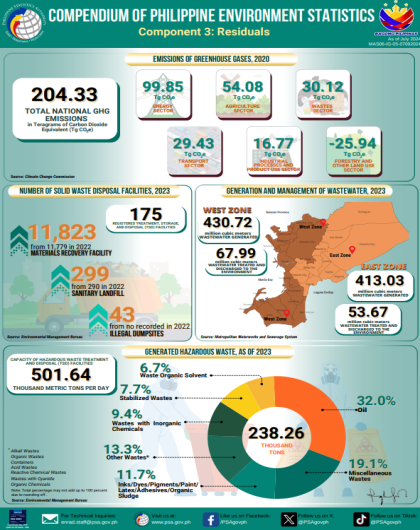The Philippine Statistics Authority (PSA), in collaboration with the United Nations Statistics Division (UNSD), conducted the high-level project launch of the “Environmental-Economic Accounting for Evidence-Based Policy in the Philippines” last 28 May 2021 via videoconferencing, attended virtually by 124 participants from various national and international partners and agencies.
This project aims to address the technical and institutional barriers to the establishment of routinely produced environmental-economic accounts at the national level. It focuses on: 1) building the institutional framework in support of the System of Environmental-Economic Accounts (SEEA) implementation; 2) building capacity to compile priority accounts on a regular basis; 3) fostering inter-institutional relationships to promote collaboration and data-sharing; and 4) promoting the effective communication and use of the accounts in supporting evidence-based policy and the Sustainable Development Goals (SDGs).
Key Messages
The following honorable guests delivered their Key Messages during the launch: 1) Socioeconomic Planning Secretary Karl Kendrick Chua, represented by the Undersecretary of the Regional Development Group of the National Economic and Development Authority (NEDA), Undersecretary Mercedita Sombilla; 2) Mr. Gustavo Gonzalez, United Nations Resident Coordinator in the Philippines; and 3) Ms. Gemma Van Halderen, Director of the Statistics Division in the United Nations Economic and Social Commission for Asia and the Pacific (UNESCAP).
Session 1: The SEEA Project and the SEEA Initiatives in the Philippines
Ms. Alessandra Alfieri (UNSD) introduced the project from a global perspective, with a link to the national implementation in the Philippines, during the first session. PSA Assistant National Statistician Vivian Ilarina discussed the history of the Environmental and Natural Resource Accounting (ENRA) in the Philippines as well as the PSA's current environmental accounts.
Session 2: From SEEA to Policy Applications
The second session of the launch depicted the presentations of the three distinguished panelists that were focused on how environmental-economic accounting link to related policy needs and priorities in the Philippines. PSA Director Benjamin Arsenio Navarro of the International Cooperation Unit served as the moderator during the panel discussion.
Ms. Susan B. Villar of the Department of Environment and Natural Resources (DENR) discussed the link between the SDGs and the DENR mandate. She emphasized the collaborative strategies of the DENR and NEDA with the PSA to bring the Natural Capital Account (NCA) Roadmap to the mainstream of government plans and programs.
Undersecretary Mercedita Sombilla (NEDA) stressed on the government’s commitment in ensuring ecological integrity, and a clean and healthy environment as one of the country’s bedrock strategies to ensure a healthy and resilient Philippines by 2022. She discussed the potential use of NCA in setting and prioritizing SDG indicators.
Dr. Gem Castillo of the Resources, Environment and Economics Center for Studies (REECS) highlighted the respective initiatives of REECS, Resource and Environmental Economics Foundation of the Philippines, and Economy and Environment Group Philippines on the environmental concerns of the SDGs. He mentioned various projects, capacity building activities, research and training, as well as the promotion of regional collaboration to address global and local economic and environmental challenges.
Session 3: Advancing the SEEA Agenda
Dr. Lisa Grace S. Bersales, Project Consultant, discussed the project timelines and milestones, focusing on the opportunities for inter-agency collaboration. She mentioned the national plan and roadmap for the project with land accounts as the first initiative. Included in the project’s way forward is the identification of policy priorities, country interests, relevant stakeholders, and capabilities for the SEEA implementation.
-Macroeconomic Accounts Service, Sectoral Statistics Office

